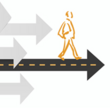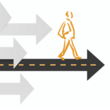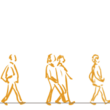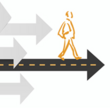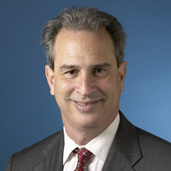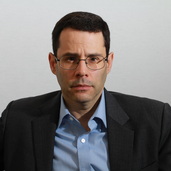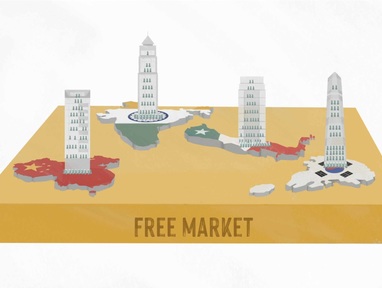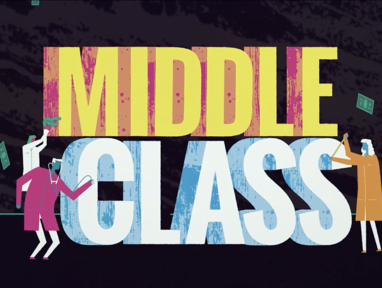Reasons to Be Thankful

The year 2020 will not be remembered as a year of progress. From the COVID-19 pandemic to geopolitical tensions, it may seem like the world is going backwards. But we shouldn’t forget that people in the 21st century are wealthier and freer than at any other time in history.
As we approach the holiday season, let’s explore the many reasons we should be thankful, even in 2020.
How prosperous are we?
In just over a decade, the world has experienced two widespread economic downturns. While the causes—a financial crisis and a pandemic—were different, the recent economic troubles could make one pessimistic about the world economy. But today’s economic challenges shouldn’t distract us from the massive economic improvements the world has experienced in recent decades.
They have been global. Since the 1970s, billions of people have been lifted out of poverty. Economist Ed Lazear examines the economic effects of market reforms in China and elsewhere:
Today, the poorest Chinese earn five times as much as they did just two decades earlier. Throughout the 1980s and before, a large fraction of the Chinese population lived in abject poverty. Today’s poor in China remain poor by developed-country standards, but there is no denying that they are far better off than they were even two decades ago. Indeed, the rapid lifting of so many out of the worst state of poverty is likely the greatest change in human welfare in world history.
It is not just China. From South Korea to India, poverty has plummeted. True, Lazear notes, inequality has risen in these nations, but the absolute gains made by the poorest are unprecedented in human history. As the video below highlights, it is nothing short of an economic miracle.
Globally, the economic improvements may be miraculous, but what about in the United States? Pessimists can point to statistics by the US Census Bureau that show that middle-income families haven’t seen their incomes rise by much, or at all, in recent decades. These statistics, however, fail to capture real economic improvements made by middle-class people. In the series The Numbers Game, economist Russ Roberts shows how the US middle class has performed far better than official statistics suggest.
First, the official statistics don’t account for how changes in household demographics affect the numbers. There are more senior households and single-parent households now than in the 1980s, which distorts income statistics. A paradox arises where all types of households could be better off, but overall averages could suggest no improvements. If you correct for this fact, you find middle-class families are doing better. In a review of income research, Roberts finds:
When you follow the same people over time, the largest gains over time often go to the poorest workers; the richest workers often make no progress. The most dramatic claims by the pessimists that no one is making progress other than the rich are wrong.
It is not just changing demographics that obscure substantial improvements in Americans’ standards of living. Official statistics fail to account for substantial quality improvements. The items we buy today might have higher prices than the ones sold in the 1970s, but few consumers would want yesterday’s goods over today’s, even if the prices were much lower. From cars and televisions to health care, the goods and services we buy today are far better than what was available decades earlier. Likewise, many of the goods and services we take for granted—smartphones, the internet, or car airbags—were not even available in the 1970s. In the video below, Roberts explains how these quality improvements are not captured in our income statistics. The result is that we vastly understate how much our lives have improved.
In the series America’s Exceptional Economy, Lazear explains how the nation’s economy still offers unrivaled opportunities. Whether we look at income growth, long-term unemployment rates, or income mobility, the nation’s economy outperforms most of the world. That’s why the nation remains the destination of choice for immigrants. As Lazear argues in the video below:
Do people want to come here? Look at the length of the queue of people waiting for green cards relative to the number of green cards issued over the past five years or so. What we see is that four times as many people are in the queue for a green card as are actually issued one in any given year.
What explains our prosperity?
Prosperity is driven by innovation. Whether it is a new product or figuring out a better way to deliver goods, innovators make us wealthier. Innovation, however, doesn’t happen by accident. It requires risk taking and a promise that this risk taking, if successful, will be rewarded. In the video below, Milton Friedman explains the importance of risk taking in delivering prosperity:
In his essay “Innovation, Not Manna from Heaven,” political scientist Stephen Haber explains how innovation is a process:
Innovation is, in short, about risk taking—but it is not about taking wild risks. It is about taking calculated risks—to start a company, to become an inventor, to invest in specialized skills, to deploy one’s capital—in an environment in which it is common knowledge that lots of other people are taking complementary calculated risks. The key to innovation is therefore the maintenance of a social and institutional environment in which calculated risk taking is incentivized.
Until very recently, much of the world population suffered under socialist governments that failed to give people incentives to take these risks. Since the 1980s, however, market-oriented reforms in China, India, and elsewhere have sparked massive improvements in living standards. Lazear examines how transitions from socialism to freer economies affected economic outcomes. Using different indices of economic freedom, he finds that “providing more economic freedom improves the incomes of all groups, including the lowest group.”
India serves as a clear example of how a deliberate policy shift to free markets lifted millions out of poverty. After India gained its independence in 1947, the nation adopted a series of socialist policies. Former US ambassador to India David Mulford explains how these policies “failed for nearly seventy years to achieve the levels of growth its people desperately needed to rise out of poverty.” In the 1990s, the Indian government began privatizing government-controlled businesses, reformed the nation’s tax policy, and pursued many other liberal reforms. Mulford summarizes the effects of these reforms:
These difficult policy actions, given India’s long history of socialism and state management of economic policies, brought major growth benefits from 2004 on, until the shock of events around the COVID-19 virus and the apparent weakening of the government’s continuing commitment to free-market, growth-oriented policies began to have negative effects.
How free are we?
Throughout history—including in the 20th century, most people were under governments that deprived their citizens of basic freedoms. These included political freedoms such as the right to vote or protest government action, as well as economic freedoms like the right to own property and choose where to live and work. Today many people are still living under illiberal regimes, but considerable progress has been made.
The progress is particularly evident in eastern Germany, where millions now live under a democratically elected, liberal government that protects most economic and political freedoms. Thirty years ago, the same region was locked behind the Iron Curtain and Communist rule. In his essay “Leaving Socialism Behind: A Lesson from German History,” Hoover Institution senior fellow Russell Berman reminds readers of life in East Germany under Communist rule:
Between the formal political division of Germany in 1949 and the final hardening of the border with the construction of the Berlin Wall in 1961, a constant population flow from east to west took place, a movement away from Soviet-style socialism and toward western capitalism. East Germans stopped voting with their feet only when the construction of the Wall in Berlin made it impossible to leave; outside the capital, prohibitive barriers already had stretched across the whole country. Nonetheless, many continued to try to escape, and hundreds lost their lives, shot by border guards in brave attempts to “flee the republic,” as the crime was cynically designated.
Life is now far better for those formerly behind the Iron Curtain. As Berman notes in his conclusion: “The East Germans chose to abandon socialism in order to pursue greater prosperity and political freedom through integration into the liberal democracy and social market economy of the Federal Republic. There are few regrets.”
We can see a similar expansion of freedom in many places that were once stuck under authoritarian regimes. Former Soviet-bloc countries such as Estonia, Latvia, and Lithuania have pursued liberal reforms and are now members of NATO and the EU. Meanwhile, South Korea and Taiwan have become vibrant democracies after many years of autocratic rule.
Of course, not all nations have become freer. Venezuelans and Cubans are suffering under authoritarian regimes. In China, economic liberalization has not led to expansions of political freedom. In his essay “How Freedom Is Caught between Socialism and Capitalism in the Indo-Pacific,” historian Michael Auslin examines how the Chinese Communist Party (CCP) is systematically undermining existing political freedoms, particularly in Hong Kong. However, despite the actions of the CCP, Auslin notes, other nations in the Indo-Pacific region are not following China’s example. Instead, people in the region’s developing nations look to Japan and its democratic system as a model for sustainable prosperity.
Conclusion
Yes, there are plenty of reasons for pessimism. The global economy has undergone a shock that will likely take many years to overcome. Illiberal regimes in China and elsewhere remain opposed to economic and political freedoms that are key to human flourishing. The pandemic exposed significant weaknesses in government policy making.
While these challenges are daunting, they are not intractable. As we have seen, reasons for optimism abound. This is particularly true in the United States. In the video below, General James Mattis reminds us that “our Constitution was designed to withstand great stress, and it has given us a form of government capable of profound correction to address injustice.”
Our institutions have withstood significant challenges in the past and have proved resilient. They have produced widespread prosperity and have helped secure our political and economic freedom. They give us ample grounds for being thankful this holiday season.
Citations and Further Reading
The Hoover Institution’s Human Prosperity Project investigates the historical record in an objective and scholarly manner to assess the consequences for human welfare, individual liberty, and interactions between nations of various economic systems ranging from pure socialism to free-market capitalism.
In our Policy Insights edition on the American labor market, we explore the unique dynamism of the US economy and offer reforms that can expand opportunities for more workers.

